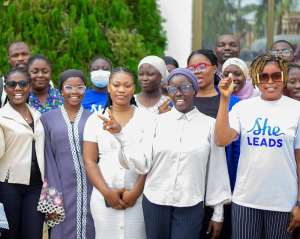
Community Aid for Rural Development (CARD Ghana), a Non-Governmental Organization, has held a one-day capacity-building training on local governance structures and processes for networks of women and youth-led associations in the Upper West Region.
The event, held on June 14, 2025, forms part of efforts to strengthen the She Leads Social Movement under the She Leads Project being implemented in the region with support from Plan International Ghana.
The She Leads project aims to increase the sustained influence of girls and young women on decision-making and transform gender norms in formal and informal institutions.
President of the She Leads Social Movement in the region, Felicia Baganiah, described the training as timely and strategic in strengthening their advocacy efforts.
She said many of the members lacked understanding of how to engage with duty-bearers, often bypassing essential grassroots structures like unit committees and assembly members.
She added that the session helped participants understand “the key people or channels we have to effectively engage, that is from the grassroots level up to people in higher authority.”
She stressed the inclusive nature of the She Leads Social Movement, noting that while the platform is focused on girls and young women, it works in close collaboration with youth associations, civil society, and even individuals who share similar advocacy goals.
She noted that future plans of the movement include more deliberate engagement with boys on sensitive issues such as menstrual health and teenage pregnancy to foster shared responsibility.
Mr. Abubakar Nii Adjetey Siddiqi, Wa Municipal Statistician, took participants through Ghana’s decentralized local governance system and explained how young people, especially girls, could leverage structures from the unit committee level to the district assemblies to seek redress and participate in decision-making.
He emphasized the importance of understanding how the system works to make advocacy more targeted and effective.
Speaker of the Upper West Regional Youth Parliament, Mr. James Baba Anabiga, described advocacy as “an intentional series of steps that are taken to influence policy,” stressing its critical role in championing the interests of young people and girls.
He outlined various strategies for effective advocacy including lobbying, media engagement, use of social media, petitions, and in extreme cases, demonstrations or legal action.
Mr. Anabiga praised the use of the media in particular, citing it as “a very key ally in helping the Youth Parliament achieve results in several advocacy campaigns.”
Legal practitioner, Lawyer Alhassan Ziyad Hudi, spoke on the legal foundations for inclusion and participation, citing the recently passed Affirmative Action Law as a key step toward promoting gender equality in governance.
He said although the law had been passed, its operationalization still required the establishment of a gender equality committee and legislative instrument to fully implement its provisions.
He added that local governance itself was designed to promote inclusivity, including the participation of women and girls, but warned that tokenism, bringing women into decision-making spaces without giving them real power, remains a challenge.
He called for continuous capacity-building to help girls and women understand their power and how to use it meaningfully within the system.
Participants described the training as insightful and empowering.
Fauzia Zila Seidu, a member of the She Leads Movement, said the breakdown of decentralization structures and advocacy strategies was “not just a turning point for me, but for many participants who never knew the role of unit committees or how to effectively lobby.”
Another participant, Yahaya Hidahiatu, said the session was “not only educative and empowering, but I really had fun and networked with others.”
Regional President of the Fulbe Youth Association of Ghana (FUYAG), Ahmed Salifu, said the training had equipped him and others with the knowledge and tools to engage in proper advocacy from the grassroots.


